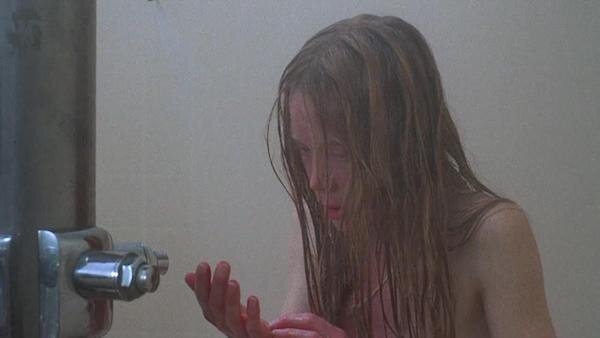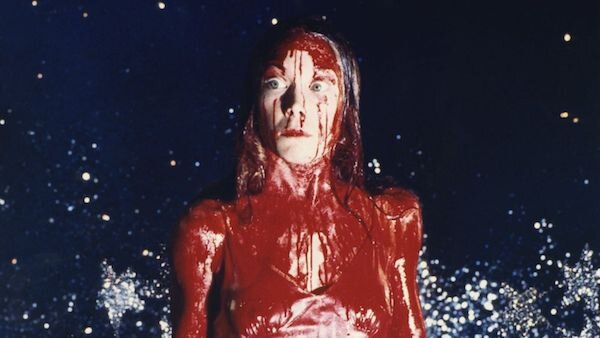Brian De Palma’s Carrie tells a story of dwindling control, of a young woman’s changing body and her journey to regain autonomy. Where one character grapples with telekinetic powers and an abusive mother, another writer connects with Carrie, after recovering from a series of eating disorders. Saffron Maeve writes on the teenage girl coming undone.
The walls are on fire and kids are being trampled under two-inch heels. A bucket killed the prom king. Bloody kitsch and ecclesiastical fantasy wrestle and relent. The words “they’re all gonna laugh at you” sprout legs and run toward us at full force. There are floating knives and shattered mirrors, and enough bitchy teenage jockettes to fill a zoo. It’s no wonder that Brian De Palma’s Carrie is considered a classic; it’s a gem of its genre whose pop culture contributions have spoiled us for nearly 45 years. Carrie and I first met on an aptly red fall afternoon when I was 14. It was a mouth-agape, shout-at-the-TV-alone experience. One so joyfully engrossing that you’d never guess that day marked the beginning of an eating disorder.
On that afternoon, now mentally inscribed as Carrie day, my first attempt at a diet—a bowl of lukewarm vegetable stock—was teetering on my lap. It smelled of nothing and tasted god-awful. At 14, I had a vague understanding that diets could be harmful, but I knew very little about what constituted an eating disorder. My only exposure to them had been a non-exhaustive and wilfully out-of-touch health class, where we watched ’90s after school specials about the dangers of starving yourself, or sucking back food only to retch it up later. It felt too removed to be anything perilous, and the hammy dialogue (“Do you want to be thin or do you want to die?”) did our inattentive, acne-laden class no favours.
I’d love nothing more than to say that dieting neatly bookended my proximity to disorder; that my stomach didn’t spend years shrinking and ballooning; that I never secretly vomited in friends’ toilets, but I’d be lying. Six years post-factum and one year after recovering, Carrie takes on a new form. It’s not just a film that coincided with my efforts to lose weight, but one whose take on dwindling body sovereignty I now understand myself.
The film wastes little time before abetting the male gaze, with its opening credits overlaying a smutty long take of teenage girls in a locker room. Pan to gawky misfit Carrie White (Sissy Spacek), bathed in steam under a phallic shower head. A fluty score plays overtop close-ups of her thighs and stomach, thrumming unspoken erotica. These masturbatory intimations place the female form in the hands of the audience, as something to be ogled, toyed with, chewed over and spat out. Something small, delicate, and conquerable; a vehicle for sex. But that score quietens and the hazy mist lifts, the second that menstrual blood stains the screen.
That foreboding image of white soap running in red streaks down Carrie’s leg marks the beginning of the film’s terror. Not a terror necessitated by psionics or squealing pigs, but one of losing control of a body you thought you knew. Confusion melts into hysteria as Carrie eyes the cherry-coloured matter on her hands. “You’re a woman now,” her mother later explains, in a voice teeming with shame. Carrie, who knows nothing about menstruation and assumes that she’s bleeding out, frantically grasps at her peers with bloodied fingertips. She knows she needs help, but can’t articulate what kind.
The film’s premise can easily be interpreted as anti-feminist—a teenage girl getting her period triggers a supernatural bloodbath—but measuring movies by their skeletal storylines, and hoping not to dig up misogynistic subtext, is an exercise in futility. While I’m wary of positing Carrie as some empowering figure, there is breathing room in the interpretation of her actions. We can contend that her violence isn’t isolated, instead born from preexisting trauma. That, maybe, Carrie’s actions had less to do with revenge or succumbing to Satanism, than they did with reconciling her fragile mind and changing body.
While the plot hinges on PMS-induced calamity, De Palma also vilifies sexism by way of Carrie’s mother, Margaret. Margaret staunchly upholds the belief that women are the weaker sex, bulldozed by sinful impulses and always atoning for them. She suspects Carrie’s period is an extension of Eve’s frailty and that her husband’s infidelity was Satan’s doing. Carrie’s peers may be cruel, but her struggle for autonomy is arguably buried in her upbringing. One which swapped hair brushing and bedtime stories for religious tangents and hair-pulled trips to the closet to pray. If I had to point to a single antagonist, I wouldn’t wave my finger at Carrie, Chris Hargensen, or Billy Nolan, but at the knife-wielding woman who repeatedly strikes her daughter with a Bible. It’s only after Carrie develops telekinetic abilities that she can loosen her mother’s grip and act on her own accord. In a heated argument about Tommy Ross and the prom, she latches the windows shut with her mind. “Witch!” spits Margaret. With a teary smile, Carrie exhales. “I’m going Mama, and things are gonna change around here.”
There’s a flicker of something resistant in Spacek’s eyes here. It’s one you could easily miss had her performance not been so stylized, but between soppy pleas and the violin shrieks of the repurposed Psycho score, it stands out. It’s not resentment or rage, but something far more vicious: superiority. Maybe the Dionysian takes over and victim becomes villain, or maybe Carrie genuinely begins to pity her manic, god-fearing mother. All viewers can discern is that this isn’t the same girl who would flinch when she heard the front door open; this Carrie, rosy-cheeked and oddly compelling, isn’t afraid. She doesn’t just have control over her own body, but she can now bend the will of others with a single piercing glance.
This veneer of autonomy makes Carrie feel safe and protected, even when she’s not. I felt a similar reassurance when I would skip meals or purge. At 14, then at 16, and again at 17, 18, 19, these were ways for me to soothe the feeling of something swelling in my throat. In hindsight, I was trying to shrink a heavy, sad body that I didn’t know how to take care of. What’s that achingly resonant line from Fleabag? “I want somebody to tell me how to live my life.” Miserable as they may be, eating disorders (or, in Carrie’s case, telekinesis) will gladly do that for you.
As Carrie gets angrier, her powers begin to swallow her whole. They decide when and how she’ll act, whether she’ll shatter a mirror or murder her gym teacher, or both. Carrie screams in the locker room and a lightbulb implodes. She gets frustrated at the principal and an ashtray flips, spilling hot cigarettes onto his desk. I tuck into a sleeve of Oreos on my friend’s kitchen floor, and my body furtively tells my brain to spit them back up. Unfortunately, the feeling of having something lodged in your throat doesn’t acquiesce just because you wish it would. You either manage to get it out or leave it be until you choke. In a moment of fear and fury, Carrie chokes.
It’s nearly impossible to mention the film without picturing Carrie, bouquet of roses in hand, in a baby pink dress soiled with blood. Standing on that chopping block of a stage, Carrie is shrouded in a reminder of her own horrific body; one that bleeds, wrecks, and is repeatedly ransacked at will. We know what happens next and we recontextualize it in whichever way is most fashionable; she’s a monster, an icon, “good for her,” “psycho bitch.” I admittedly used to favour the psycho bitch side of that binary, but I also used to cry after eating toast. People change. Where there once stood a telekinetic teenager hellbent on revenge, there’s now a wide-eyed girl curving her anguish with destruction—of buildings, their inhabitants, and most notably, herself. Somebody who is not good, and not bad, but stuck in a painful cycle.
Every October, when the leaves bleed their familiar red hue, I wonder where I’d be if not for Carrie day. Could I have done things differently? Or were those years of dysmorphia and sticky binges always on the cards for me? What if Carrie hadn’t gotten her period after gym class? What if the people in her life hadn’t been so cruel? Sometimes I’ll catch myself living in these fantasies; I pour milk into my cereal without counting the calories, take up a sport, and keep flowers on my dresser. I vomit only when I drink too much or have the flu. Carrie wears pink, writes poetry, and hems dresses with her adoring mother. She spends Sundays at church and Monday mornings poring over Greek tragedies she’ll never have to understand. What lovely, boring lives we’d lead.
Saffron Maeve (@saffronmaeve) is a film writer studying English and Cinema at the University of Toronto, with aspirations to have her own Criterion closet video. When she’s not writing, she can be found rewatching The Goonies and pestering everyone she knows to do the same.




